Aug 14, 2025 – Liberation Day 80th Anniversary Ceremony and Forum
Hello. Today, one day before the 80th anniversary of Liberation Day, we held a commemorative ceremony and forum under the theme “Light and Shadow of 80 Years of Liberation.”
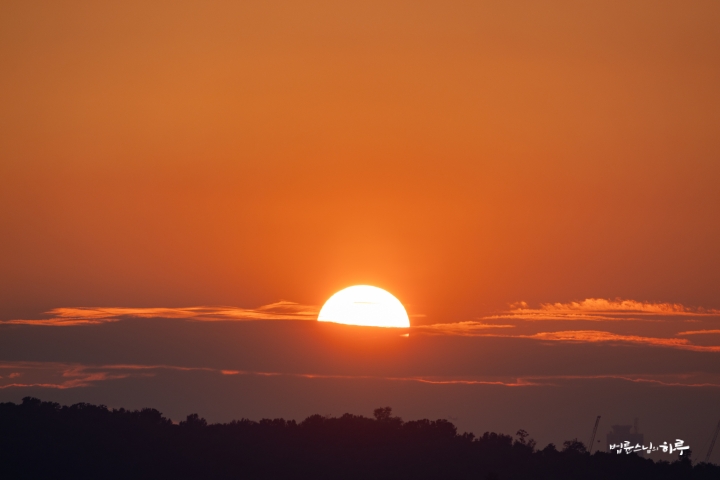
After completing morning practice and meditation, Sunim headed to the Jungto Social and Cultural Center. At 8 AM, Representative Jeong Cheong-rae of the Democratic Party of Korea visited, and they shared breakfast and tea together.
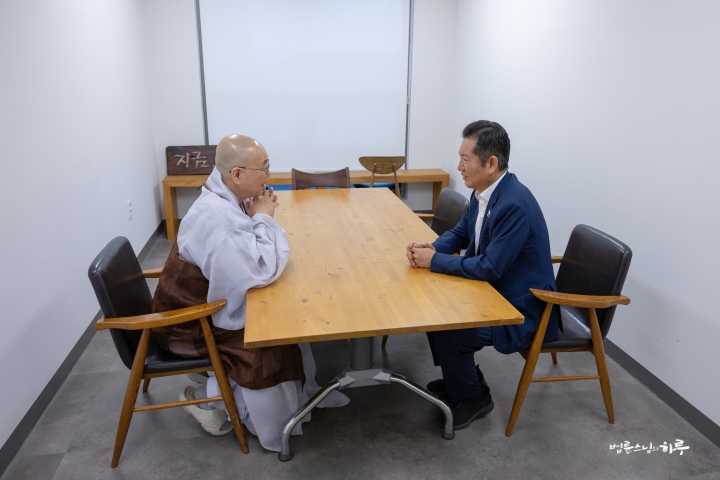
Sunim had extensive discussions about what needs to be done now for peace on the Korean Peninsula and national unity.
“Thank you for making time despite your busy schedule. I will deeply reflect on what you shared today.”
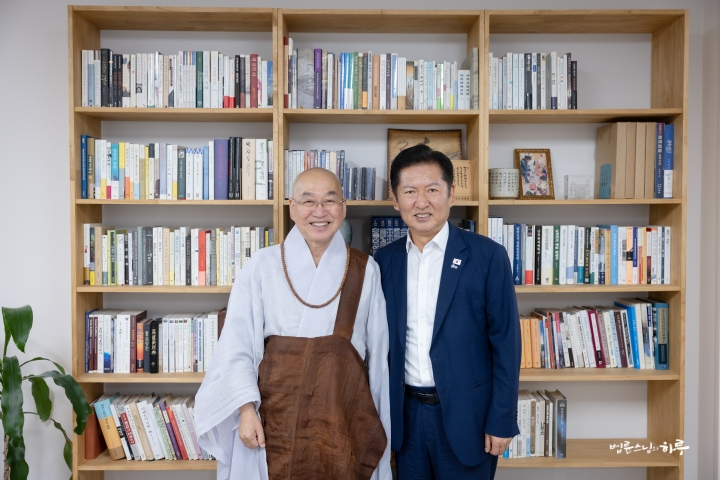
After seeing off the guest, Sunim attended the JTS interim board meeting from 10 AM. After reciting the Three Refuges and Words for Practice, the JTS Secretary-General explained the reason for convening the interim board meeting. As a result of JTS’s dedicated activities in Sri Lanka over the past two years, a request has been made to establish a JTS branch with Sri Lankan people at the center.
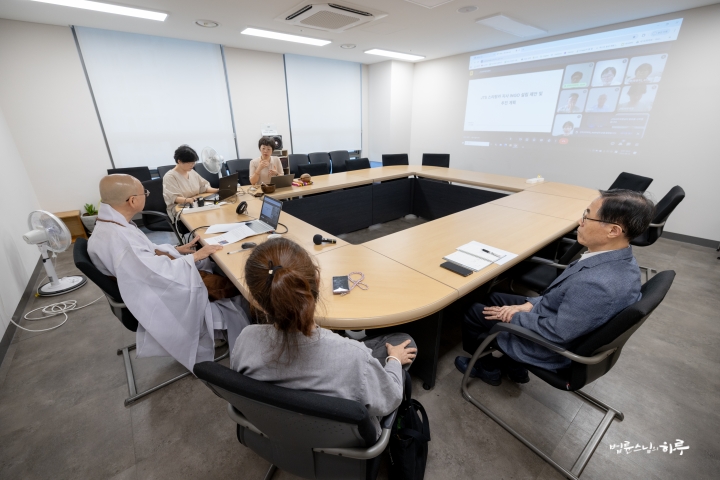
After an hour of discussion, the board unanimously decided to establish a JTS branch in Sri Lanka. While independent corporations have been established and operated in India and the Philippines, a new experiment will be conducted in Sri Lanka where local Sri Lankans will take the lead in operations without dispatching Korean volunteers.
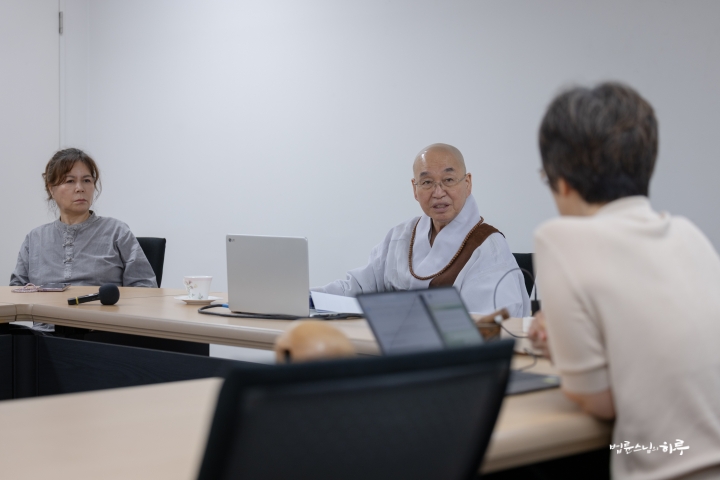
From noon, Sunim had tea with social dignitaries who arrived early at the venue.
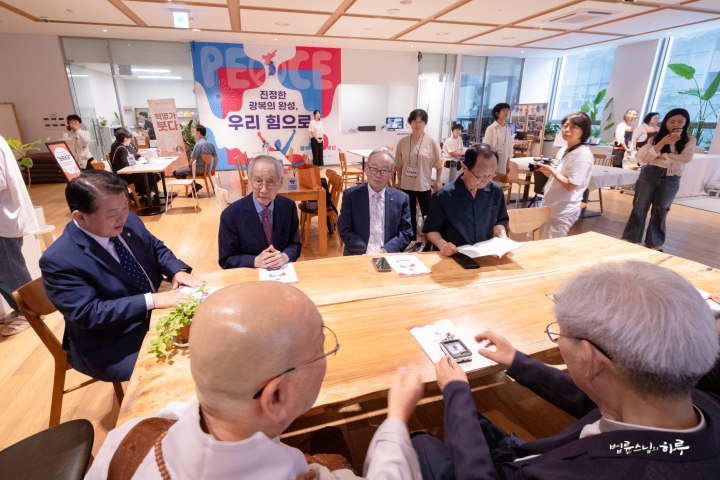
At 12:30 PM, they moved together to the second-floor lounge to participate in a handprint performance. A photo zone was prepared where participants could make handprints with their wishes for the 80th anniversary of Liberation Day. First, former Minister Yoon Yeo-jun made his handprint.
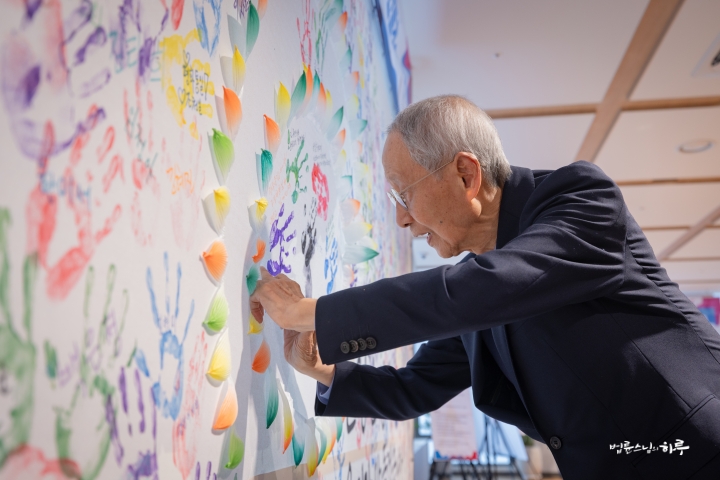
Next, Sunim made his handprint. He first wrote his wish with a pen, then made his handprint above it.
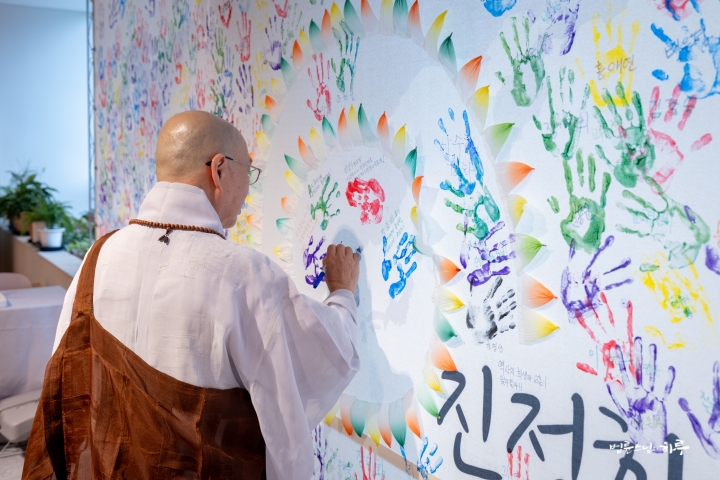
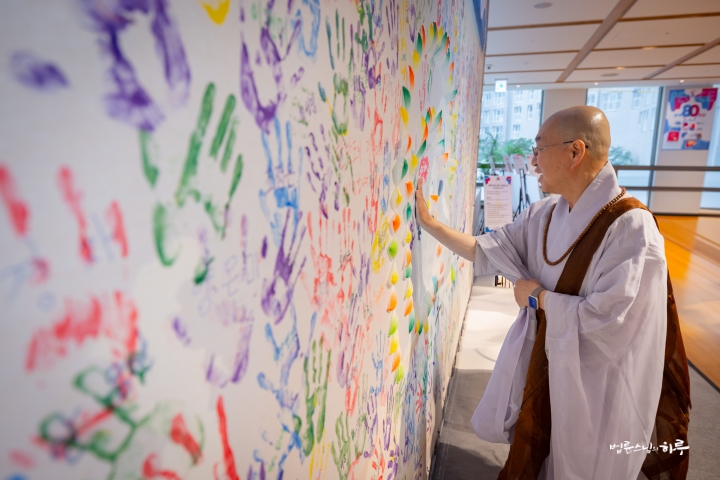
After making the handprint, he also shared words of commitment toward the camera.
“Let’s continue doing well what we’ve done well over the past 80 years, and let’s work together to make up for what’s lacking in the future.”
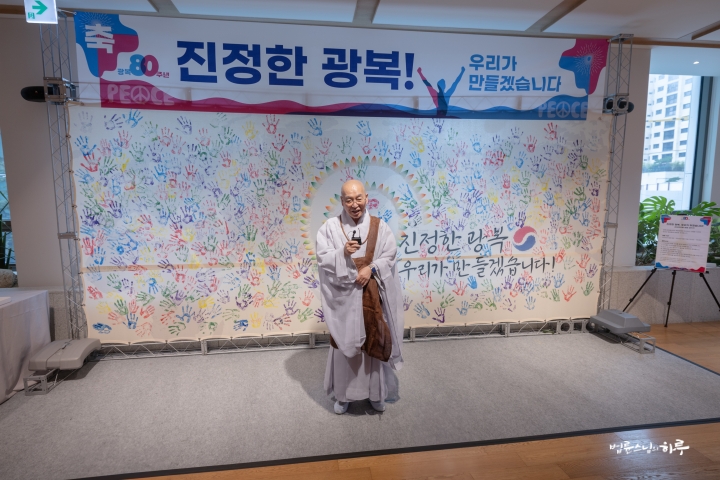
Subsequently, social dignitaries took turns making handprints and sharing their commitments to the camera. First, Democratic Party member Kim Byung-joo made his handprint.
“On the 80th anniversary of Liberation Day, I hope that the floodgates of peace will open quickly on the Korean Peninsula, an era of peace will arrive, and ultimately peaceful reunification will be achieved.”
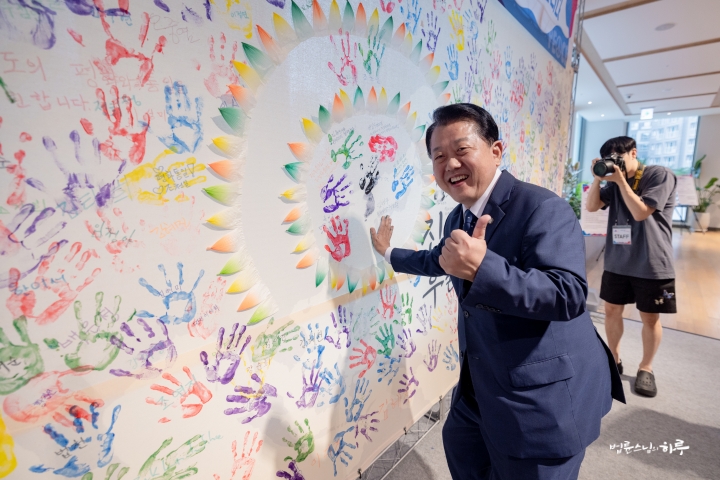
Religious leaders working together for national reconciliation and peace – Reverend Park Nam-soo, Pastor Park Jong-hwa, Bishop Park Kyung-jo, Father Kim Hong-jin, and Gyomu Kim Dae-sun – also made handprints and shared their commitments.
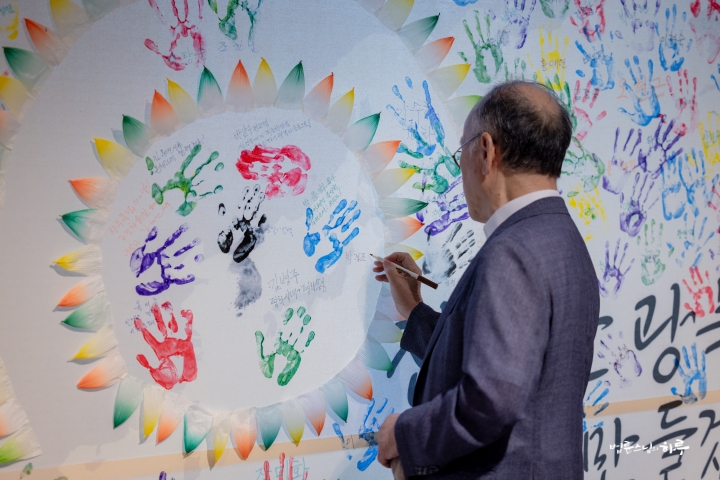
“One era has come to an end and we stand at a new starting line. The 80th anniversary of Liberation Day is a new beginning. Let’s work together to open a new era.”
“We will create true liberation.”
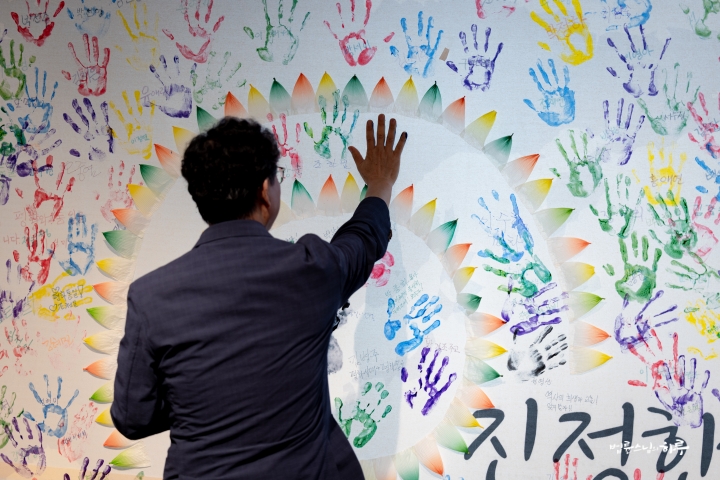
After completing the handprint performance, everyone moved to the underground dining hall for lunch. During the meal, the social dignitaries discussed how to resolve the current strained inter-Korean relations.
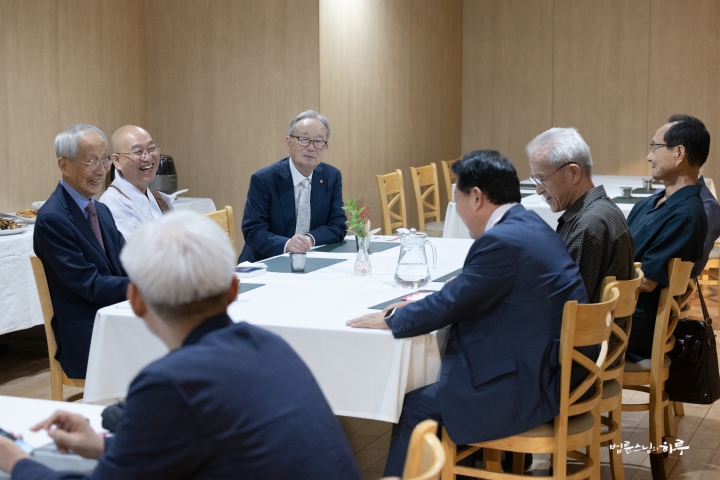
After the meal, Sunim explained the core theme of today’s event.
“The core of what experts will discuss today is whether the territorial clause needs to be revised when amending the constitution.”
“You’ve chosen a very important topic.”
Everyone moved together to the underground auditorium where the ceremony was held. At 1 PM, the Liberation Day 80th Anniversary Ceremony began with about 400 Jungto Society members and dignitaries from various sectors of society in attendance.
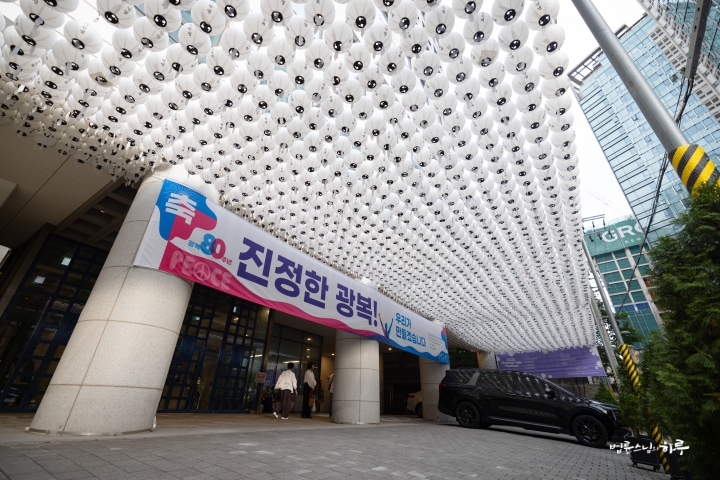
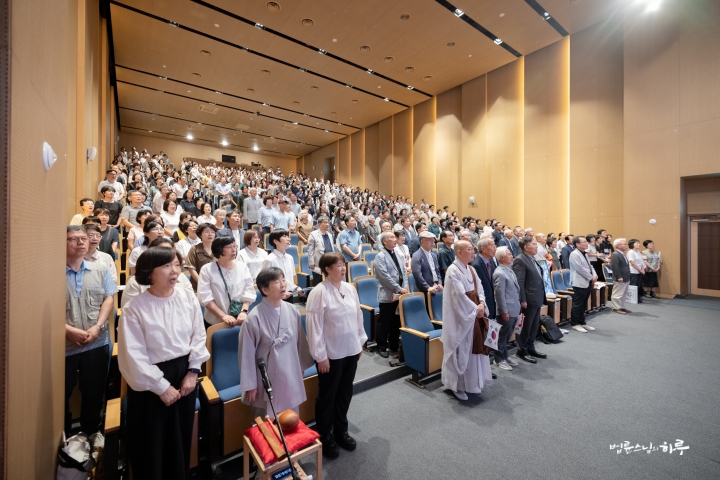
Today’s ceremony was hosted by broadcaster Kim Je-dong. When the audience’s applause was weak, Kim Je-dong drew a great response with his witty comments.
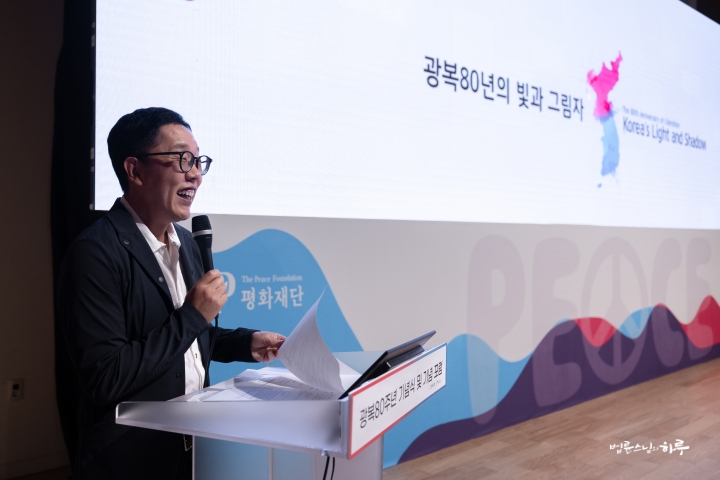
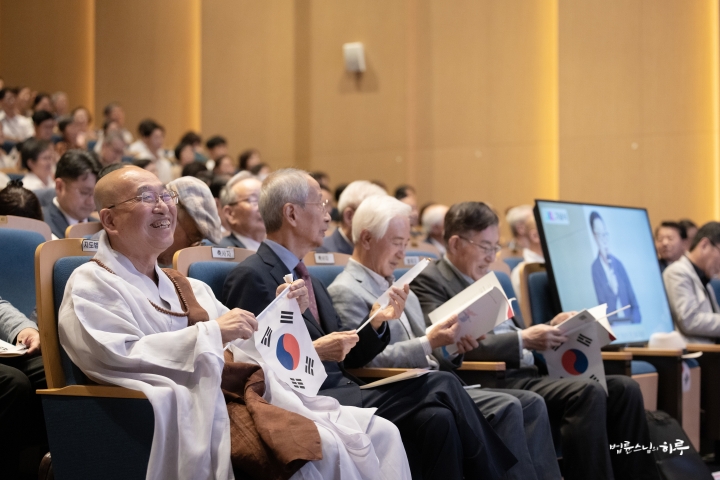
“It’s problematic to have such weak applause and cheers on the 80th anniversary of Liberation Day. Our ancestors conducted the independence movement for over 40 years with the belief that liberation was near. This gathering commemorating the 80th anniversary of Liberation Day is both a place where we enjoy that joy and where we descendants send cheers and applause to our ancestors who endured such a long time. I’m not asking for applause for me, but for warm cheers and applause for those who dedicated themselves to the independence movement.”
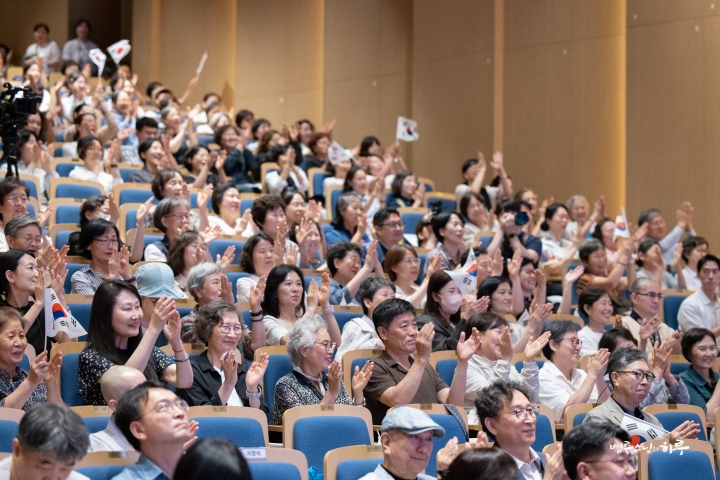
The audience opened the Liberation Day 80th Anniversary Ceremony with powerful cheers and applause. Following this, remembering the sacrifices and efforts our ancestors made for the independence of our stolen nation, they saluted the flag, sang the national anthem, and observed a moment of silence for the martyrs and fallen heroes.
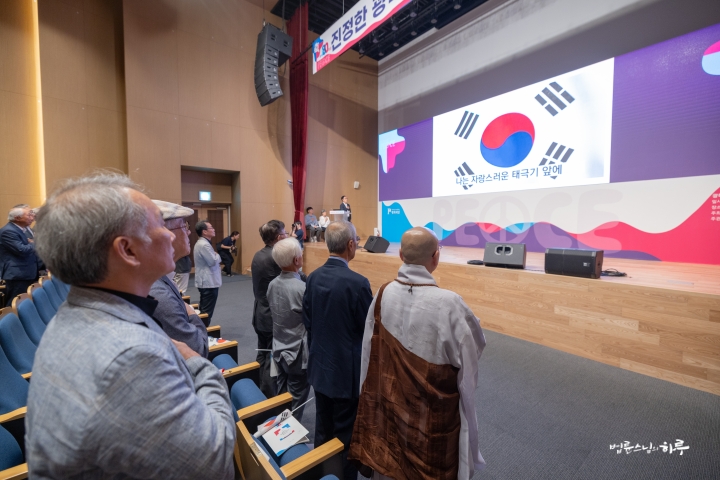
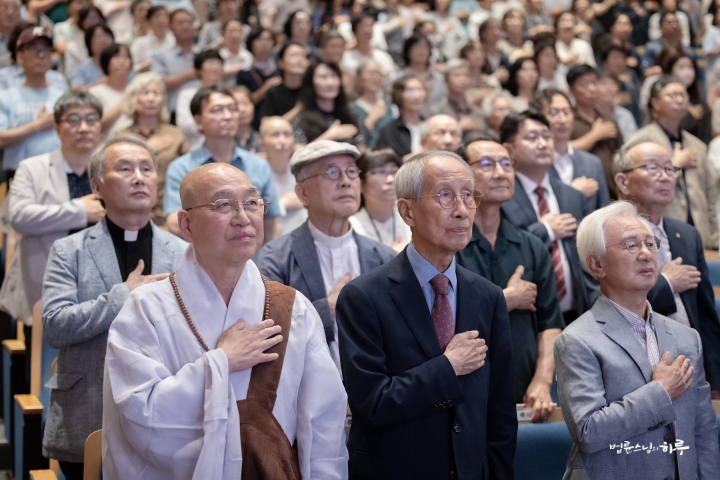
Next, they watched a video showing the footsteps of Jungto Society members preparing for true liberation through peace on the Korean Peninsula and national unity on the 80th anniversary of Liberation Day.
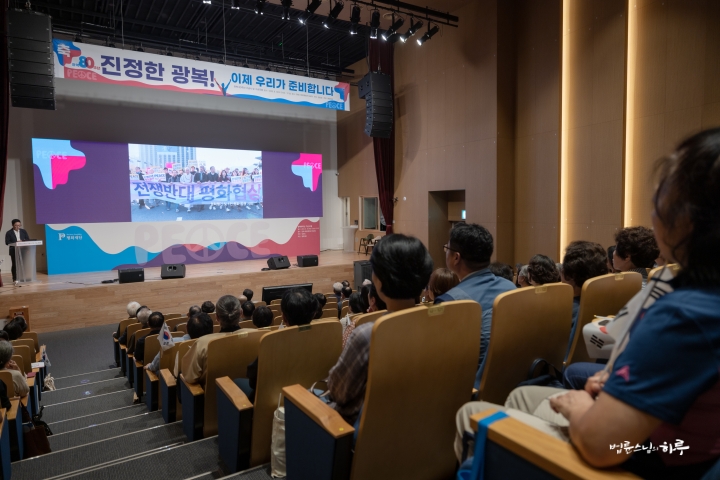
Writer Kim Hong-shin then delivered commemorative remarks.
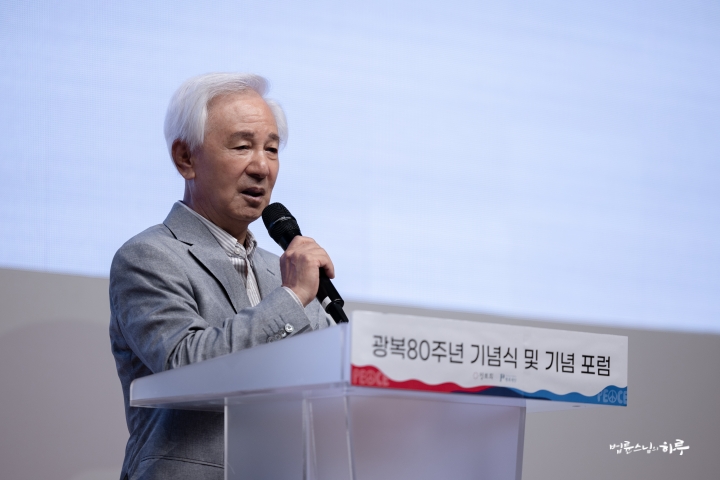
“Jungto Society has begun the great history of Korea moving toward true liberation, and I believe it will be achieved in the future. I first want to express both congratulations and gratitude to all of you. I was fortunate enough to visit Pyongyang, Kaesong, and Mt. Kumgang. Though it hasn’t even been 80 years since the division, everything has changed between the South and North, not just people’s appearances. Historians say that 100 years is enough for the same ethnic group to become different peoples. We need to think about whether we can truly achieve peaceful reunification 20 years from now. That’s why the direction Jungto Society pursues has become even more precious in this world.
There’s an old saying that we attack those close and befriend those far away. Everyone who has been married, except Venerable Pomnyun, knows this is true. (Laughter) I believe we have hope because Jungto Society members who have gathered to renew their commitment on the 80th anniversary of Liberation Day and our society’s spiritual leaders are here. So I express my respect and gratitude together.”
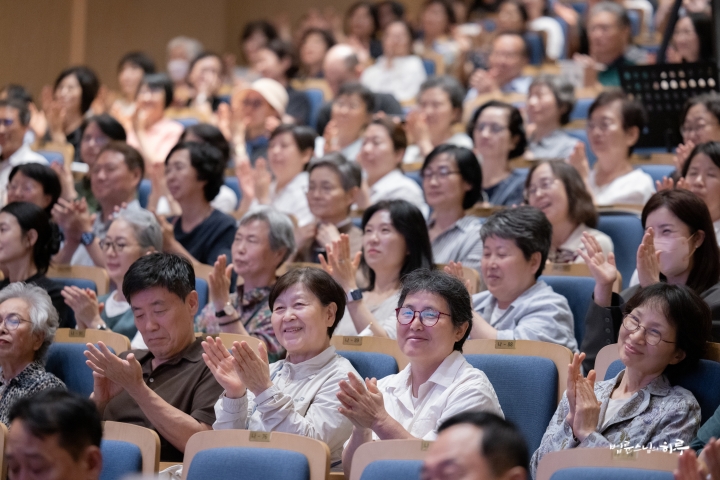
Next, they requested a Liberation Day 80th Anniversary Dharma talk from Venerable Pomnyun Sunim. As the audience offered a half-bow, Sunim began his Dharma talk.
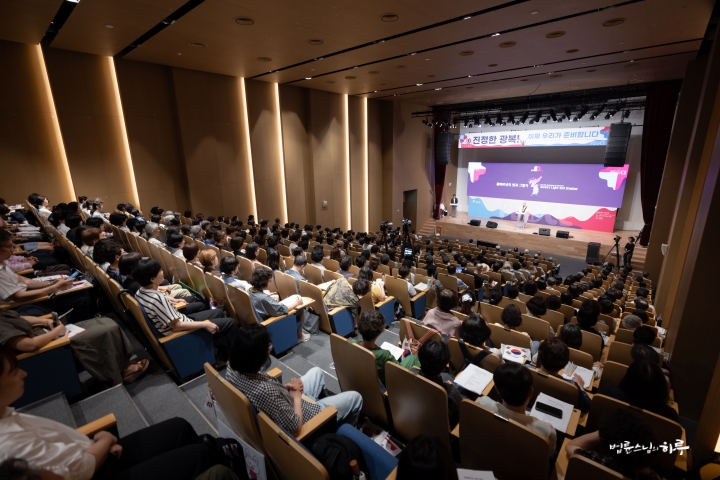
“Today marks the 80th anniversary of our liberation. Counting from the Eulsa Treaty, we achieved liberation after 40 years of losing our country, and now we’ve reached a point where the years since liberation are twice as long as the years we were colonized. Looking back on the past 80 years, there have been many difficulties. Despite numerous trials and turmoil including the Korean War, the May 16 military coup, and the Gwangju Democratization Movement, today’s Republic of Korea has reached a level we can proudly call our homeland. On this 80th anniversary of Liberation Day, I feel deep pride in the Republic of Korea.
Last week, I went on a Northeast Asian history tour to China. I also visited the Yalu and Tumen Rivers, which border North Korea. China has developed materially, with roads, rest areas, and hotels not much different from ours. However, control has become much stricter than in the past. Experiencing such control, I could feel anew how precious the freedom we normally enjoy is. I realized once again what great achievements we have made not only in economic growth but also in the development of democracy over the past 80 years.
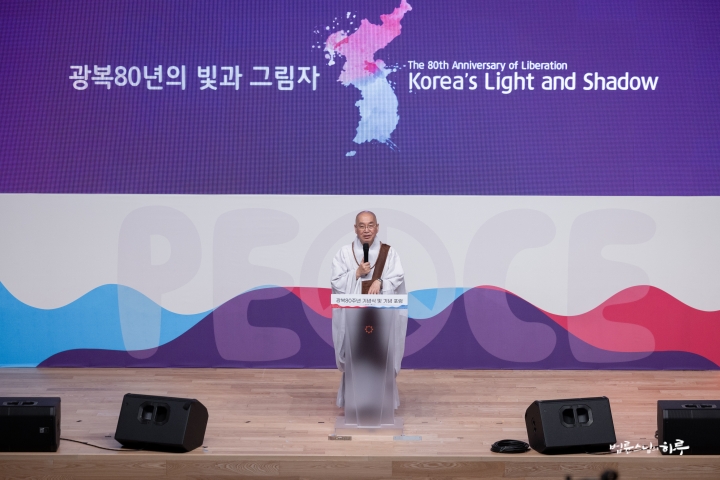
80 Years After Liberation, the Republic of Korea Brings Hope to the World
Over the 80 years since liberation, we have experienced various lights and shadows together. The first and most brilliant achievement is the establishment of the government of the Republic of Korea. We inherited the spirit of the March 1st Independence Movement and carried on the legitimacy of the Korean Provisional Government in Shanghai to establish the government of the Republic of Korea, which we have developed to this day. Although we faced great difficulties during the Korean War, we achieved direct presidential elections through the April 19 Revolution against the Syngman Rhee dictatorship, the democratization struggles of the 1970s and the Gwangju Democratization Movement against the May 16 military coup and the Yushin dictatorship, and the June Democratic Uprising that toppled the Chun Doo-hwan military dictatorship. After going through the Candlelight Revolution, we have arrived at today’s Republic of Korea. I believe that creating this independent and free democratic Republic of Korea is the first light after liberation.
The second light is national economic development. We established Five-Year Economic Development Plans and led economic growth by prioritizing heavy industry despite difficult conditions. The industrial foundation that allows us to compete with the world on equal footing with advanced countries – including Hyundai Motor Company, Hyundai, Samsung, and Daewoo shipyards, POSCO, petrochemicals, and the electronics industry – was never created automatically. It was the planning and design of our leaders, combined with the Saemaul Movement spirit in which all citizens tightened their belts and participated, that created today’s Republic of Korea. This is also an important light we have achieved since liberation.
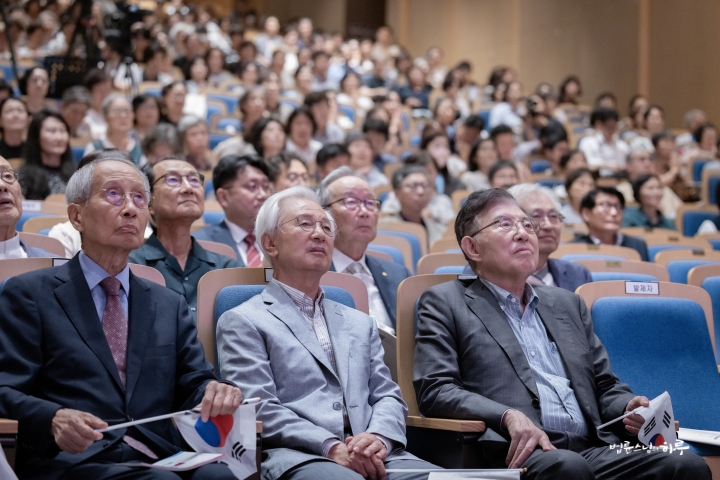
The third is the recent cultural development represented by the Korean Wave (Hallyu). Our popular culture, centered on dramas, music, and dance, has created a Korean Wave phenomenon around the world. I believe the Korean Wave will continue to develop in the future. However, I hope that Korea will play a leading role in the world not only in popular culture but also in many other fields such as politics, economy, ideology, society, and healthcare. The Republic of Korea is not a country with a large territory, a large population, or one that has been prosperous since ancient times. Rather, it was a small nation that suffered from colonial rule. However, today it has achieved political, economic, and cultural development that leads the world. I believe this goes beyond Korea’s own development and shows new hope to all people around the world.
At the same time, as we saw in the recent December 3 martial law incident, we are also a country that carries the risk of unexpected events that would be hard to imagine happening in a developed nation.
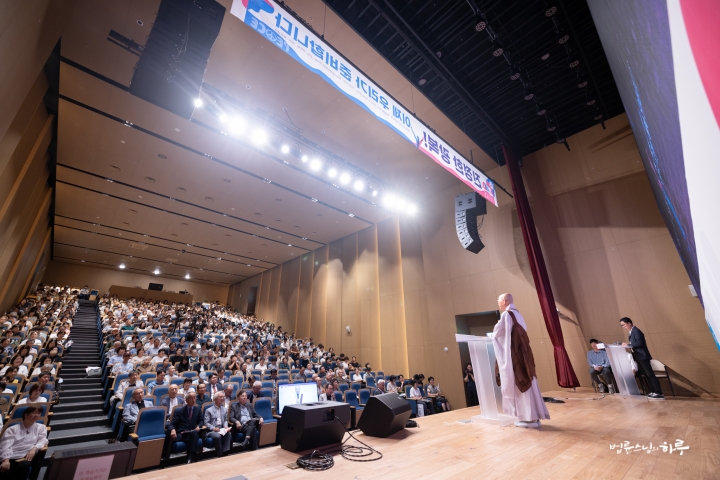
Three Shadows Before Us: The Risk of War, Division, and the Suffering of North Korean People
First, we are a country where war could break out at any time. Among developed countries around the world, there are almost no countries at risk of war breaking out suddenly tomorrow. However, our country is in such a dangerous state that it would not be surprising if war broke out tomorrow morning. The reality that the happiness we enjoy now could be destroyed in an instant – I believe this is the darkest shadow of our Republic of Korea. That’s why I think that at the very least, there should be no war, and creating a country of peace is the most important task.
Second is the reality of being a divided nation. When we were under Japanese colonial rule, we were one country. However, immediately after liberation, we were divided into two countries against our will due to the interests of major powers. In the process of dealing with Japan as a defeated nation after the war, the United States managed mainland Japan and Taiwan, while the Soviet Union managed Manchuria. Regarding the Korean Peninsula in between, the Soviet Union and the United States each claimed rights, and eventually divided it in half along the 38th parallel, with the north occupied by Soviet forces and the south by U.S. forces, implementing military governments. In other words, it was Japan that committed all the war crimes, but in the post-war settlement, the greatest loss from Japan’s defeat was borne by us, who suffered the most from Japanese oppression. This problem remains unresolved even after 80 years and has solidified into the reality of two hostile states at war. I believe this reality is the most heartbreaking as we mark the 80th anniversary of liberation. How to peacefully overcome this division in the future remains a great challenge and heavy burden for us. No matter how difficult the process may be, we must overcome this to achieve true liberation.
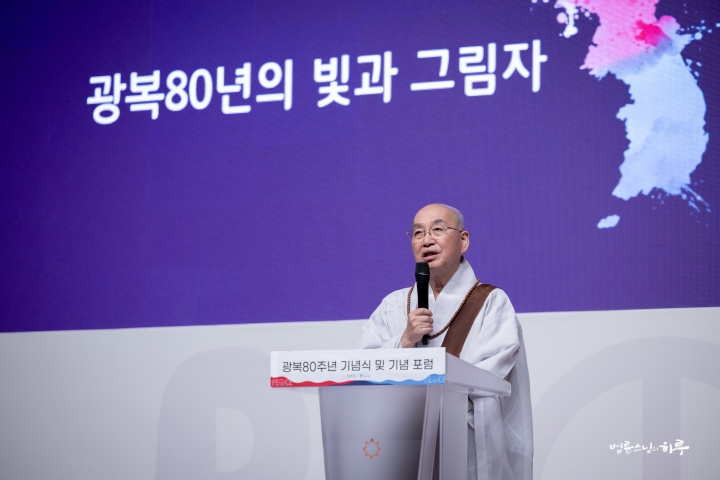
Third, 25 million of our compatriots in the North are living in extreme suffering. They live without political freedom and in severe economic poverty. Although 80 years have passed since liberation, the living standards of North Korean residents are not much different from those of poor African countries. How can we continue to turn a blind eye to this pain? How can we help them live more freely and prosperously? This cannot be resolved simply by criticizing North Korean politicians or attributing it to problems with their system. We must find fundamental solutions to this problem. If criticism could solve the problem, we could criticize as much as we want, but criticism alone cannot resolve this issue. First, security conditions must be established to reduce North Korea’s regime insecurity by improving North Korea-US and North Korea-Japan relations. Along with this, North Korea’s opening policy must be implemented so that the economic lives of North Korean residents can become more prosperous.
Toward True Liberation: Let’s End Division and the Suffering of the North
How can we have a positive influence on these matters? In the past, due to inter-Korean conflicts and confrontations, we have unknowingly played many roles in making the human rights and lives of North Korean residents more difficult. Therefore, we have a historical responsibility to improve the lives of North Korean residents. More important than whether there is one country or two is ‘how to change the poor lives of my compatriots and neighbors.’ The suffering that North Korean compatriots are still experiencing 80 years after liberation – isn’t this the great shadow of our history since liberation?
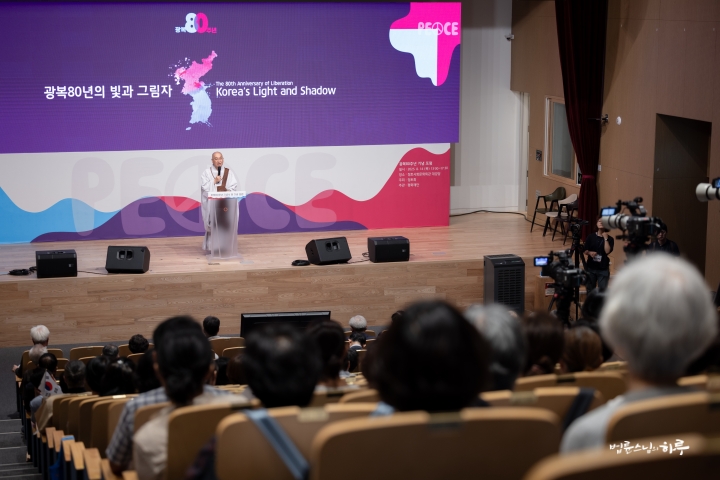
There are certainly many other shadows. If we count them one by one, there are many shadows, such as the social reality where the wealth gap is widening day by day, and the national division that has almost reached a state of civil war due to the deepening of ideological and political confrontations among citizens. However, I think these three – the danger of war, division, and the suffering of North Korean residents – are the darkest and deepest shadows among them. We must seriously discuss how to solve these problems as we mark the 80th anniversary of liberation. Whether it’s unification or division, one country or two countries, what’s more important than the form is creating a world without war and without the suffering of residents. For this, we need to go beyond the concepts of nationalism and alliances that we have held conceptually, and adopt an attitude that puts people at the center of our thinking.
Every August 15th We Ask: How Much Have We Erased the Shadow of Division?
When Jungto Society was founded, two goals were established. One was to spread the Buddha’s correct teachings widely so that suffering people could become mentally free through the Buddha’s correct dharma. The other was to become democratic citizens who, as citizens of the Republic of Korea, realize the peaceful unification of the homeland and the development of democracy as stated in the preamble of the Constitution. Therefore, these social issues are not unrelated to religion, but are social justice and religious practice that must be carried out by religious people who follow the Buddha’s fundamental teachings. This is not something that can be done or not done at will.
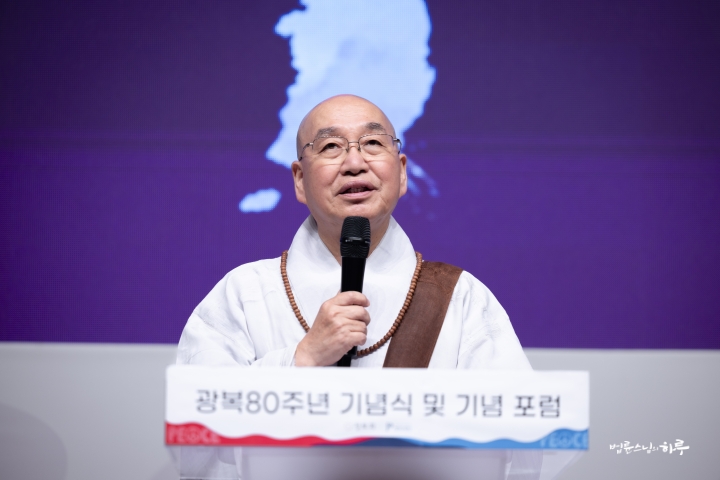
Some people ask, ‘If Jungto Society is a practice organization, why does it engage in various social activities?’ However, Master Yongseong emphasized ‘the intellectualization of Buddhism,’ which means practicing diligently according to the Buddha’s correct dharma rather than praying for blessings. He also advocated for ‘the popularization of Buddhism,’ making Buddhist teachings easily understandable and accessible to everyone, and insisted on lowering the threshold of Buddhism. Furthermore, Master Yongseong used the expression ‘Buddhism in daily life’ during the Japanese colonial period, but this didn’t simply mean Buddhist practices in daily life like putting palms together before meals. Rather, it meant ‘the socialization of Buddhism.’ During the Japanese colonial period, the independence movement was the socialization of Buddhism, and during the dictatorship era, the democratization movement was the socialization of Buddhism. If we inherit Master Yongseong’s will and spirit today, helping those in need and overcoming division to achieve peace can be called the socialization of Buddhism. This is the path we must follow.
Many people both praise Jungto Society’s activities and point out its shortcomings. As we mark the 80th anniversary of liberation this year, we make a new commitment: ‘Let us erase the shadow of division before the 100th anniversary of liberation.’ Starting with this year’s Liberation Day, we plan to continue holding Liberation Day events annually, counting down as 100-20, 100-19, and so on. While Jungto Society has consistently held March 1st Independence Movement Day events, this is our first year organizing Liberation Day events. From now on, every August 15th Liberation Day, we will assess ‘how much we are erasing the dark shadows of liberation and increasing the brightness of its light.’
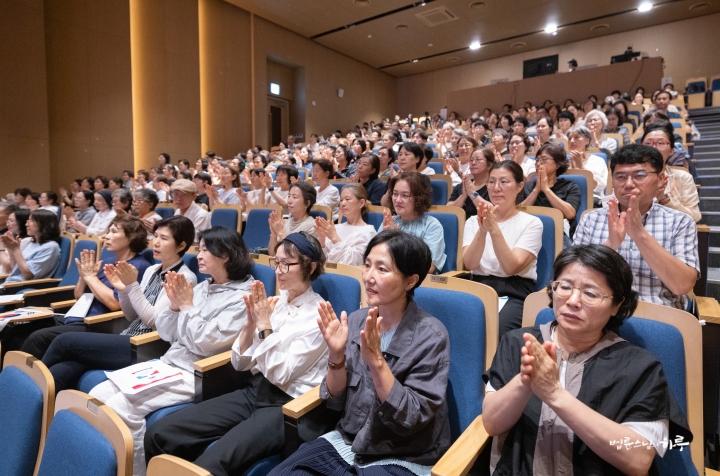
Next, everyone sang the Liberation Day song together. Members of the Jungto Society Special Youth Division came up on stage to lead the singing.
The entire audience also stood up and sang in chorus, vigorously waving the Taegeukgi flag just like on that day 80 years ago.
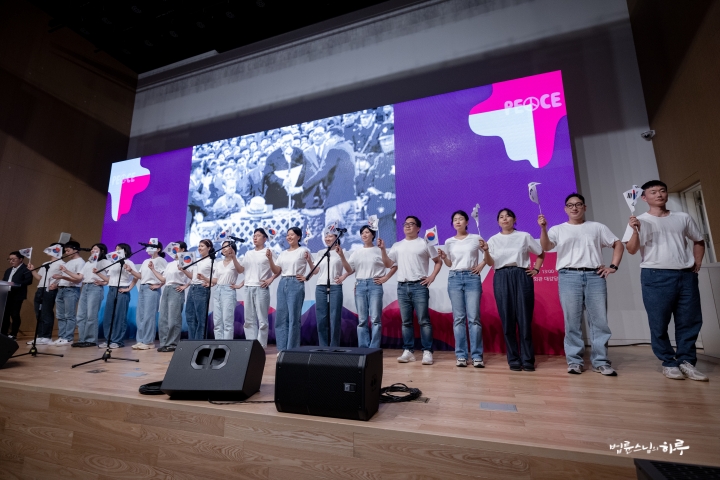
Let us touch the soil again, even the seawater dances ♬ Our elders and friends who longed to see this day, what shall we do? This day bears the traces of forty years of hot blood ♬ Let us protect it forever, let us protect it forever
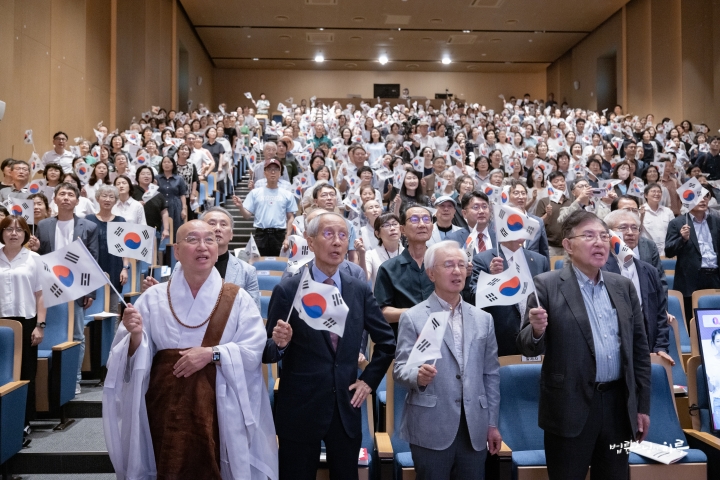
While the youth sang, images of young Ahn Jung-geun, Kim Gu, and Yun Bong-gil appeared on the screen. It was a deeply moving moment.
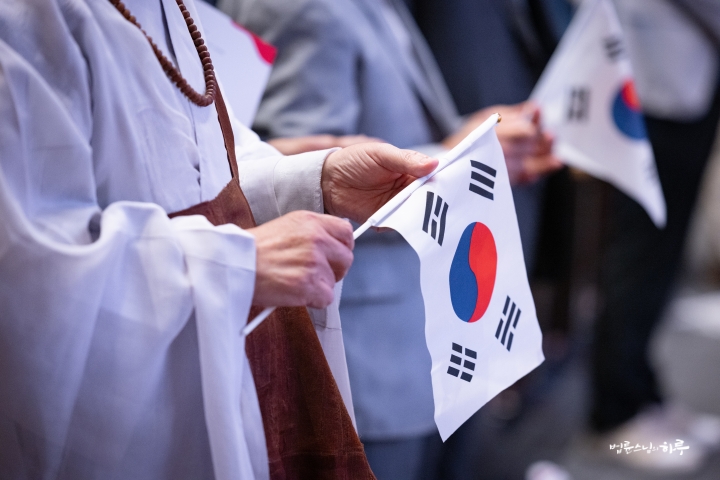
Looking back on the past 80 years of history and resolving what we who live in this era must do to achieve true liberation in the future, the ceremony concluded with the Four Great Vows.
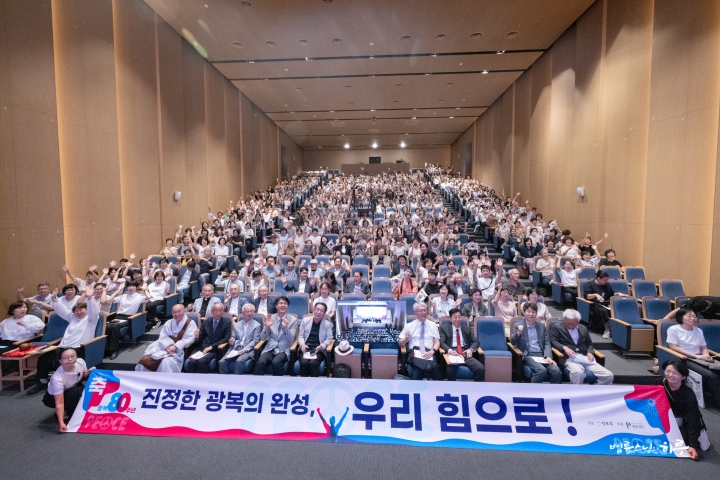
After a short break, refreshments were served. Sunim warmly greeted the distinguished guests and engaged in brief conversations with them.
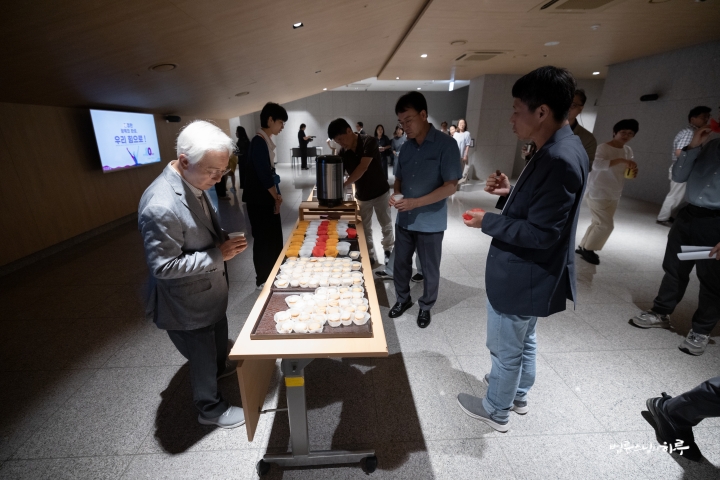
From 2 PM, the commemorative forum began with the theme “Light and Shadow of 80 Years of Liberation.” First, everyone watched a video depicting the light and shadow of 80 years of liberation.
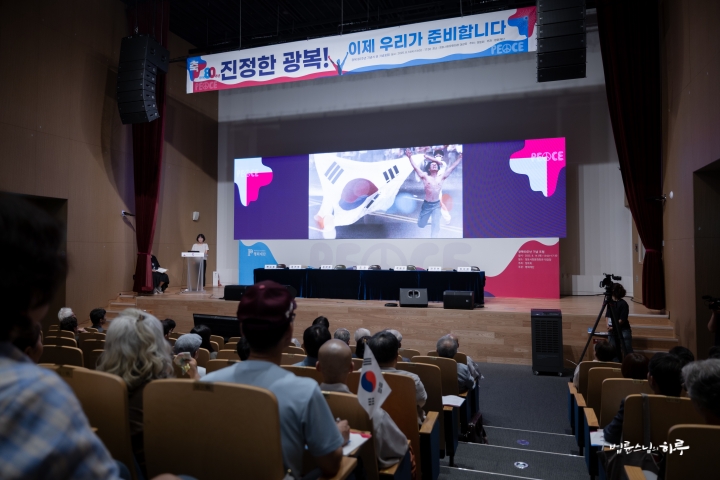
Next, The Peace Foundation’s research team presented the results of a survey on liberation and social consciousness conducted among Jungto Society members.
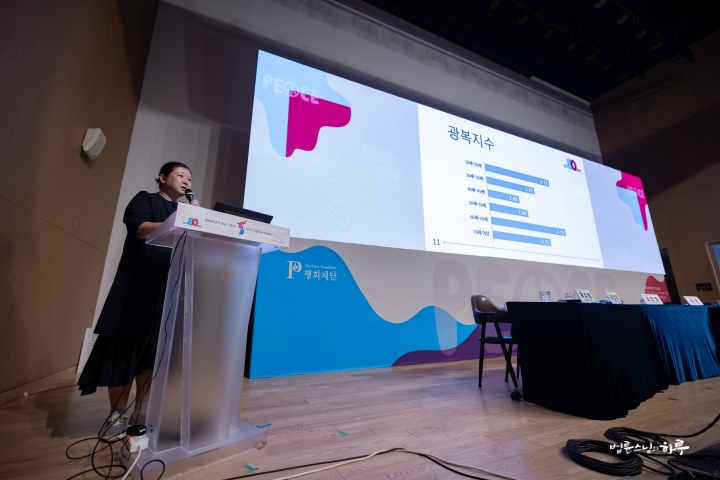
“Less than 10% of Jungto Society members believe that our society has achieved ‘true liberation.’ About half of the respondents (48.4%) answered ‘not yet,’ and the liberation index was 2.71 out of 5 points. The most important tasks identified were ‘peace on the Korean Peninsula’ (46.7%) and ‘national integration’ (31.7%). Among the five areas of politics, economy, security, integration, and diplomacy, the security liberation index (2.96 points) was the highest, while the integration liberation index (2.29 points) was the lowest, showing that conflict and distrust in our society remain serious. The survey results clearly show that during the next 20 years toward the 100th anniversary of liberation, we must focus on two pillars: completing a peace regime on the Korean Peninsula and achieving political and social integration. Liberation without peace cannot be complete, and development without integration is not sustainable.”
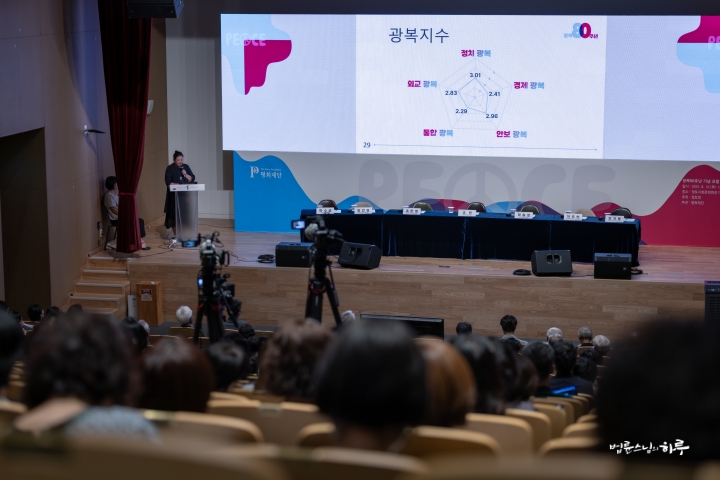
Next, under the moderation of Dr. Cho Min, a senior advisor at The Peace Foundation, presentations and discussions by experts began in earnest.
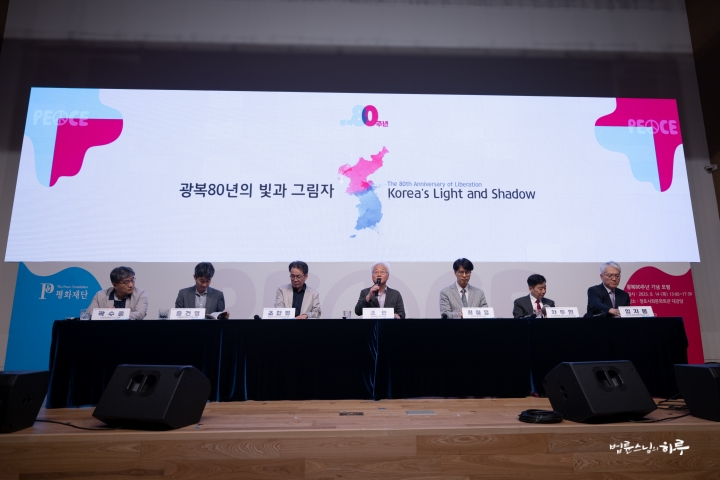
First, Professor Choi Cheol-young from Daegu University’s Law Department gave the first presentation on the topic “80 Years of Liberation and Constitutional Amendment Tasks.”
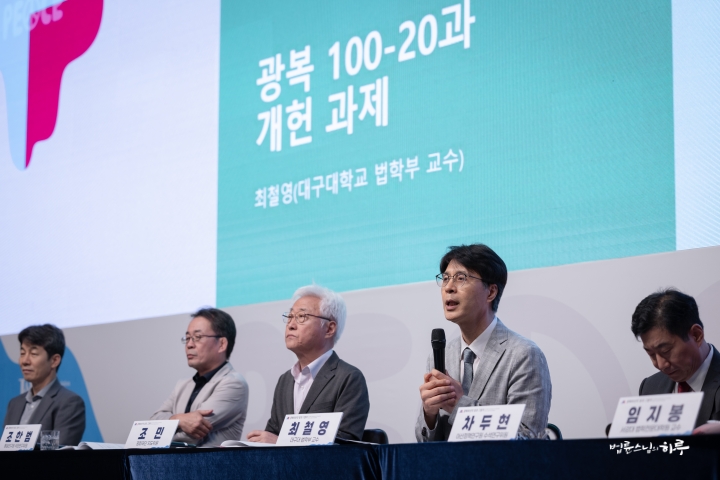
“Our current constitution still wears the clothes of the Cold War era of 1987. The territorial clause stating ‘The territory of the Republic of Korea shall consist of the Korean Peninsula and its adjacent islands’ defines North Korea as an illegal entity, and the peaceful unification clause presupposes absorption unification based on ‘liberal democratic basic order.’ However, it has been over 30 years since the two Koreas joined the UN together, and the reality of mutual exchange and cooperation has changed significantly. Now we must include peaceful coexistence of ‘one nation, two territories’ and gradual integration in the constitution.
I propose deleting or completely adjusting the territorial clause in the constitution and changing the peaceful unification clause from focusing on ‘liberal democratic basic order’ to explicitly stating ‘peace and democracy’ as the highest values. We should declare ourselves as an active peace state that denies all use of force and establish legal mechanisms to ensure the president faithfully fulfills the duty of peaceful unification. We must adopt open nationalism that transcends exclusive nationalism and pursues the values of human rights, freedom, and equality. Only then can the constitution become a blueprint for a peace community on the Korean Peninsula by the 100th anniversary of liberation.”
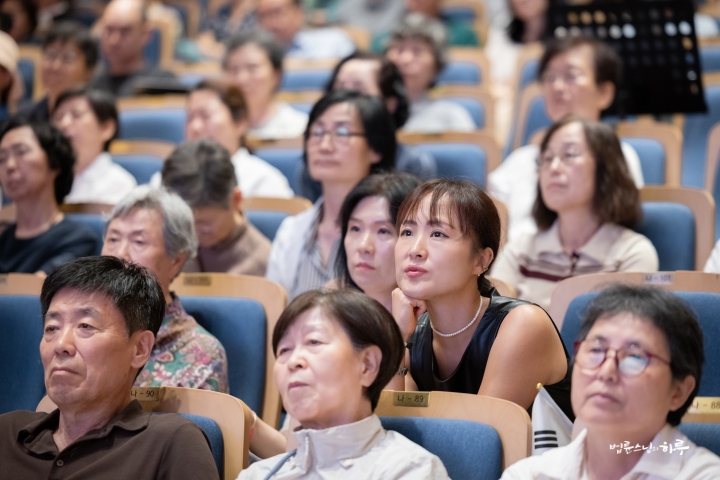
Professor Choi emphasized the need to reorganize the territorial clause and peaceful unification clause in the constitution.
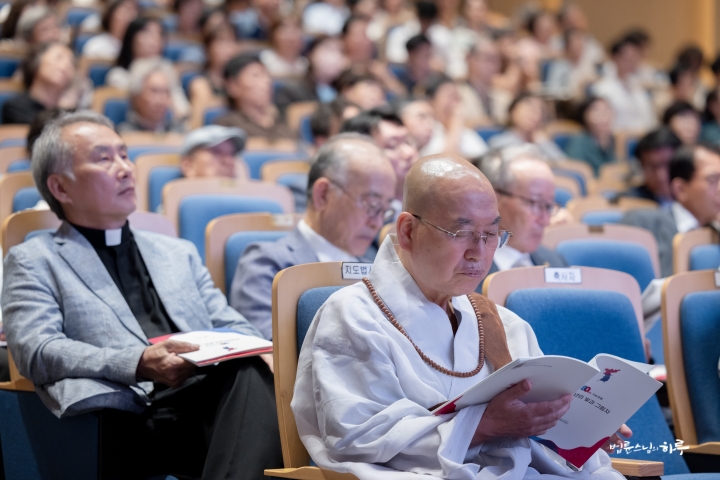
Next, Dr. Cho Han-bum, a distinguished research fellow at the Korea Institute for National Unification, gave the second presentation on “80 Years of Liberation and Security Challenges.”
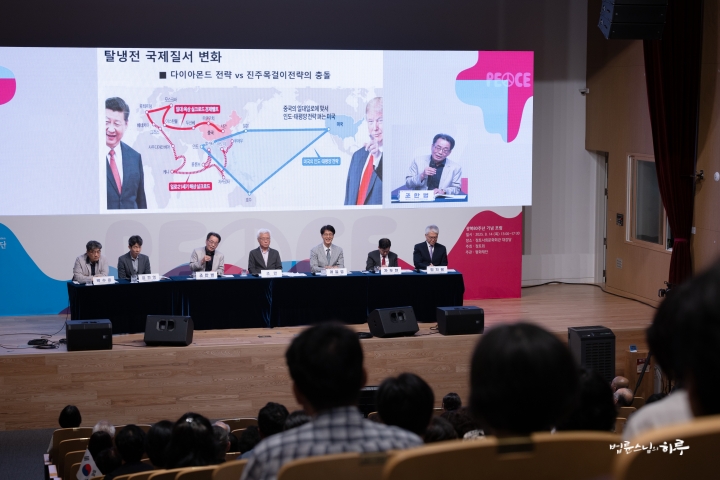
“Today, 80 years after liberation, we still stand in an international order full of uncertainty and instability. The security dilemma is deepening amid US-China strategic competition, North Korean nuclear threats, and the high-cost structure of division. Now we must establish strategic clarity based on national interests and pursue unification based on universal values under the principle of ‘peace first, unification later.’
We also need to establish active self-reliant defense to respond to global security uncertainties and reestablish sustainable inter-Korean relations that can bring about change in North Korea and gain the trust of its people. Without being confined to the Korean Peninsula perspective, we must move forward as a proactive nation that simultaneously protects national interests and peace through a Korean-style global strategy connected to the world and the Korea Initiative.”
In his presentation, Dr. Cho Han-bum presented strategic clarity and active self-reliant defense as key solutions under the principle of “peace first, unification later.”
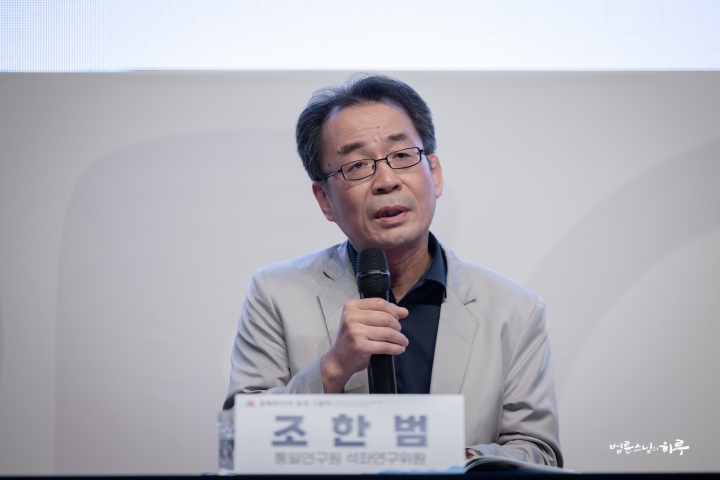
After hearing the two presentations, panel presentations followed. Dr. Kwak Soo-jong, Representative Yoon Kun-young, Dr. Cha Du-hyun, and Professor Lim Ji-bong each gave 10-minute presentations in that order.
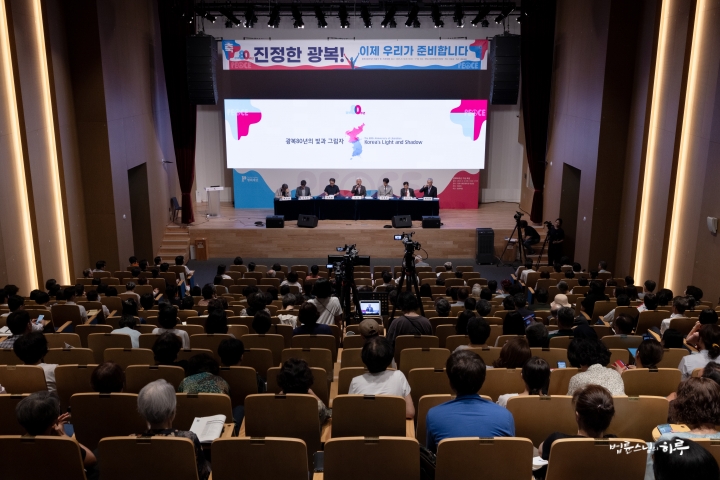
Dr. Kwak Soo-jong from the Lien Economic Research Institute mentioned the case of German unification and Israel’s attack on Iranian nuclear facilities, discussing what lessons could be learned from these examples.
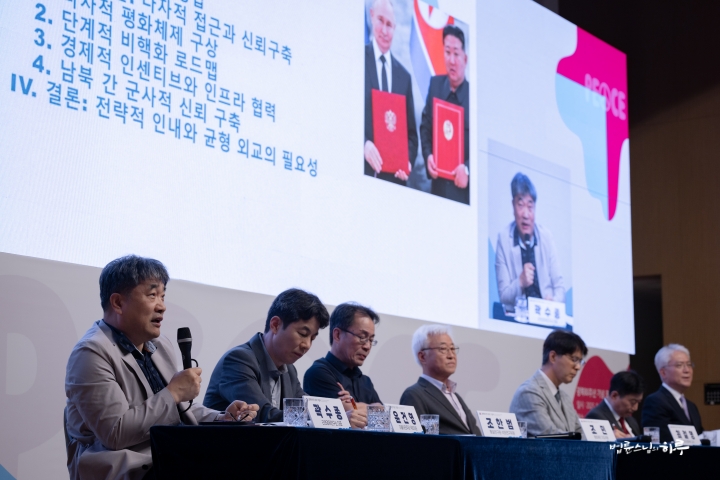
“German unification was not a coincidence but the result of thorough preparation and not missing opportunities amid changes in the international situation. The continuous economic and social exchanges and contacts between East and West Germany became the foundation for unification. On the other hand, Israel’s attack on Iranian nuclear facilities shows that when national security and survival are at stake, countries have no choice but to prioritize their own safety over international backlash. At that time, contrary to expectations, surrounding powers including China and Russia responded lukewarmly rather than strongly opposing it, and there were no significant sanctions or substantial pressure from the international community as a whole. The Korean Peninsula also needs to be backed by sober realistic awareness and national survival strategies while discussing peace and unification. In the end, opportunities come only to those who are prepared, and we must comprehensively strengthen our economic, diplomatic, and security capabilities to not miss that moment.”
Democratic Party Representative Yoon Kun-young emphasized the “peace first, unification later” approach and stressed the need for a phased approach starting with freezing and arms reduction rather than going directly to complete denuclearization.
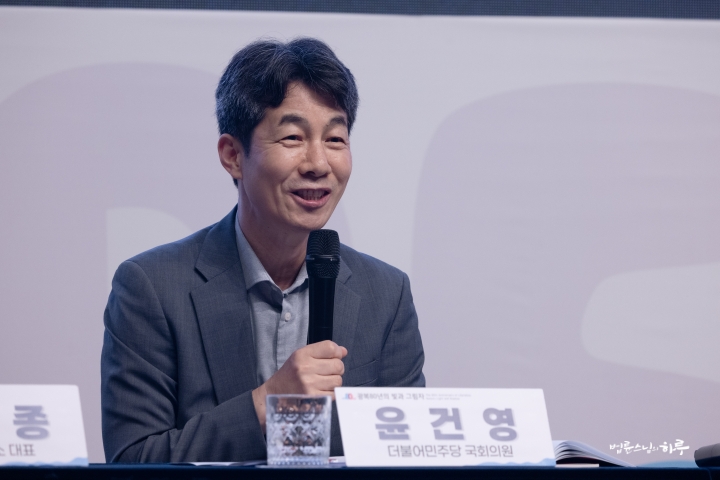
“Ten years ago on Liberation Day, regardless of party affiliation, ‘unification’ was discussed as a core task for national reconciliation and prosperity. However, now the unification discourse itself has lost its place due to extreme confrontationalism, hate politics, and intergenerational conflict. Now we must approach it as ‘peace first, unification later.’ We need to reduce political excess, find growth momentum for the two Koreas in peace, and upgrade economic cooperation like the Kaesong Industrial Complex. Unification discussions should not become the exclusive property of specific camps but must restart with national consensus. The first step is for the two Koreas to reaffirm the September 19 Military Agreement and for North Korea and the US to reaffirm the Singapore Declaration. We need a realistic approach that starts with ‘freezing and arms reduction’ toward denuclearization.”
Professor Lim Ji-bong from Sogang University Law School presented a somewhat contrasting opinion to Professor Choi Cheol-young, who talked about the need to reorganize the territorial clause and peaceful unification clause.
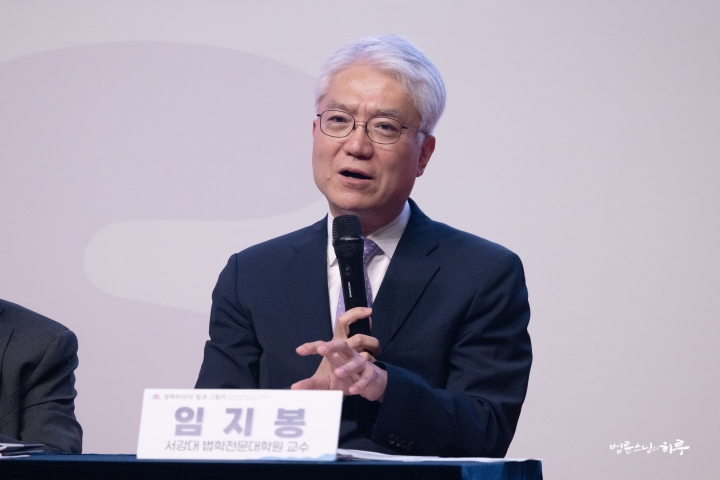
“Article 3 of the Constitution’s territorial clause is interpreted as imposing the duty to realize sovereign power over the North Korean region, that is, the ‘duty of unification,’ and the ‘unification’ here means peaceful unification, not by force. Therefore, the territorial clause is not in conflict with the peaceful unification clause but in a harmonious relationship. Since the current Articles 3 and 4 of the Constitution can be interpreted harmoniously, it is desirable to solve problems through flexible interpretation without deleting Article 3 through constitutional amendment.”
Dr. Cha Du-hyun, senior research fellow at the Asan Institute for Policy Studies, emphasized that attempts to overcome division through constitutional amendment have limitations in terms of social consensus and practical effects, and stressed the need for a sustainable unification discussion structure that is not shaken by regime changes.
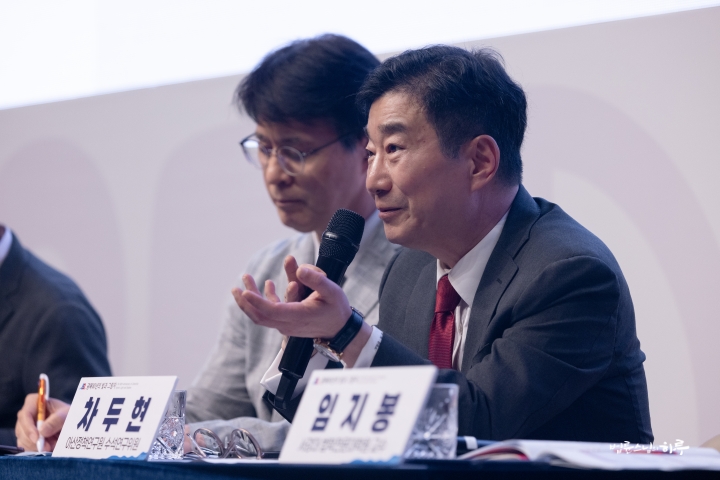
“Liberation was an event that restored our freedom, but it was also the starting point of division. Over the past 80 years, the two Koreas have continued hostility and confrontation as competing states, but that doesn’t mean coexistence and cooperation are impossible. The problem is the reality that North Korea adheres to ‘hostile two-state relations’ and refuses cooperation itself. Overcoming division through constitutional amendment raises questions about social consensus and practical effects. We must move away from a perspective that only looks at ‘inter-Korean relations’ and establish strategies combined with international cooperation and sustainable unification discussion structures regardless of government changes. While maintaining unification orientation as hope and opportunity for future generations, we must develop the concept of nation into a more universal and cosmopolitan perspective.”
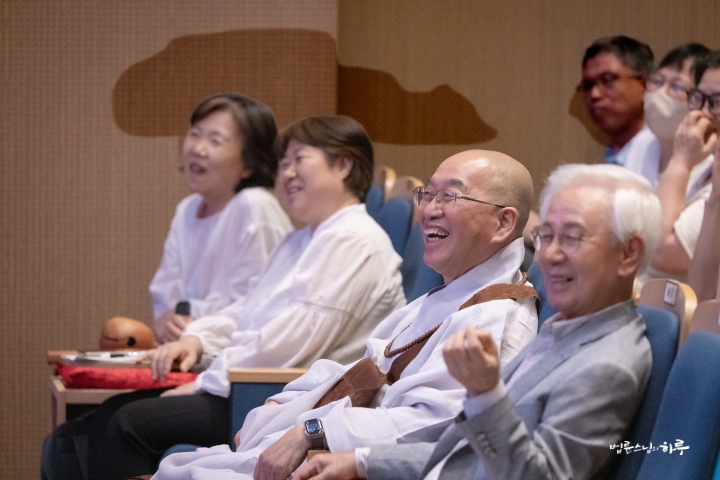
This was followed by a 60-minute comprehensive discussion session. Various solutions spanning inter-Korean relations, constitution, security, and economy were presented.
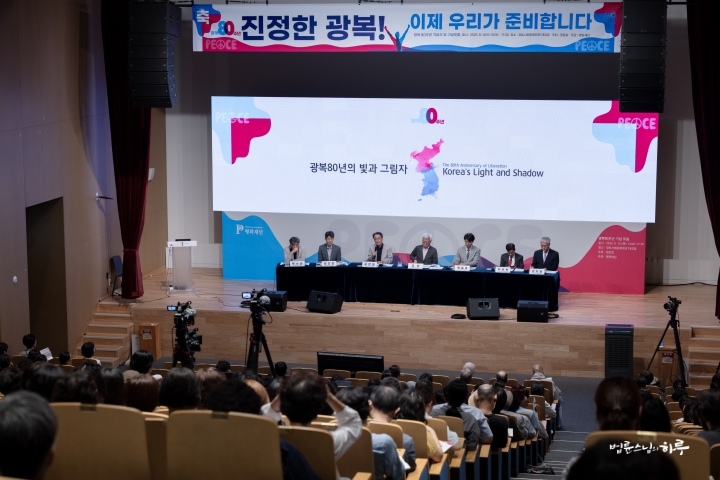
Professor Choi Cheol-young from Daegu University urged a shift in perception regarding the constitutional territorial clause. “When territory is fixed in the constitution, thinking becomes rigid. The phrase ‘territory of the Republic of Korea’ implies denial of the other,” he said, pointing out that territorial nationalism could have adverse effects on peace policy. He also mentioned that “the National Security Act has operated based on the territorial clause,” raising once again the need for constitutional reform discussions.
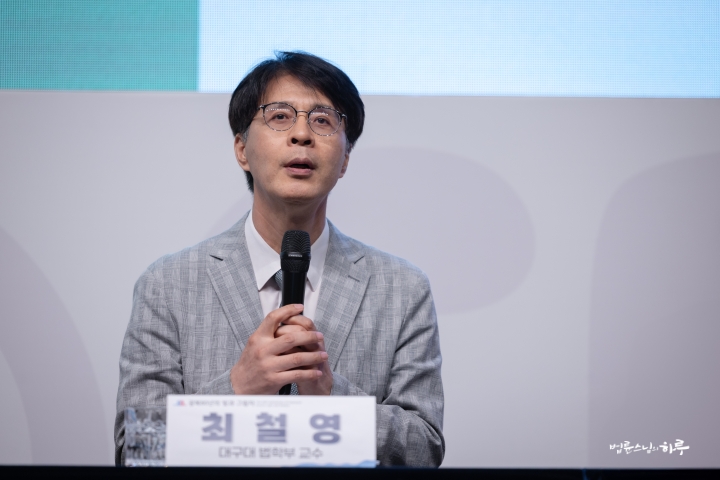
Dr. Kwak Soo-jong from the Lien Economic Research Institute connected the international economic order with national capabilities. “National power comes from the dignity of the people,” he emphasized, proposing to transcend political extremes for a mature public forum on unification discussions. Using the AI data center competition as an example, he added, “We must expand technological cooperation and the role of the private sector to prepare for unification.”
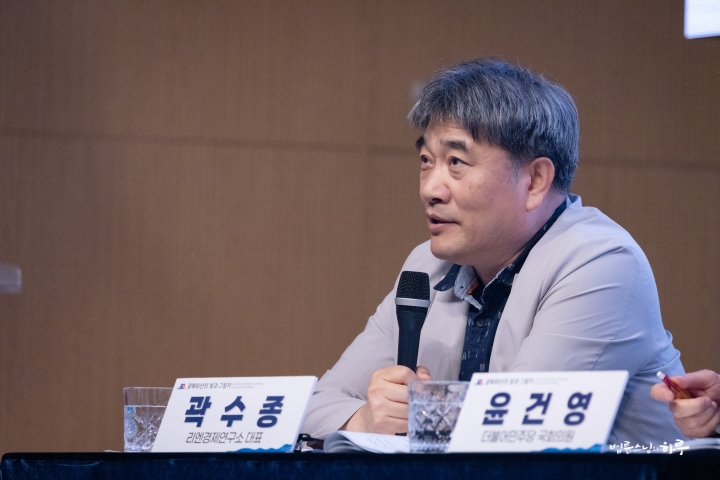
Representative Yoon Kun-young clarified the phased approach. Citing the current international situation, he advocated caution, saying, “This is an environment where haste can ruin things. Let’s steadily start with areas where the private sector can contribute.”
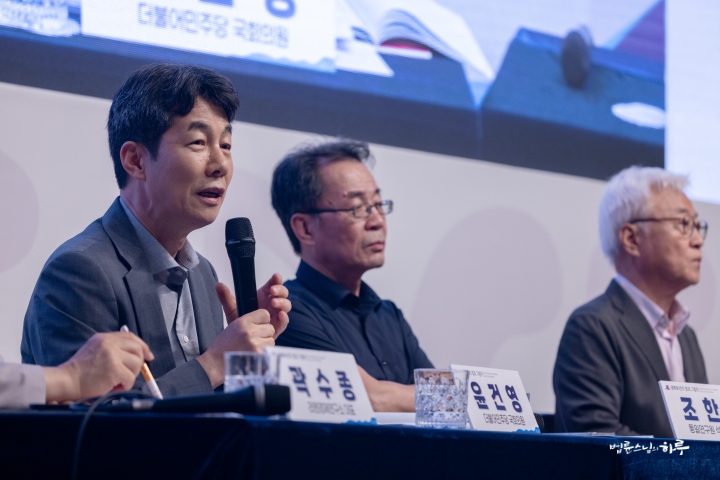
Dr. Cha Du-hyun from the Asan Institute for Policy Studies examined the practical effects of the territorial clause revision debate. “North Korea has never pushed the hostile ‘two-state theory’ because of our constitutional provisions. Policy and environment determine change,” he said, emphasizing the parallel implementation of military deterrence and diplomatic management, and warning against ‘agenda politics’ that divides camps.
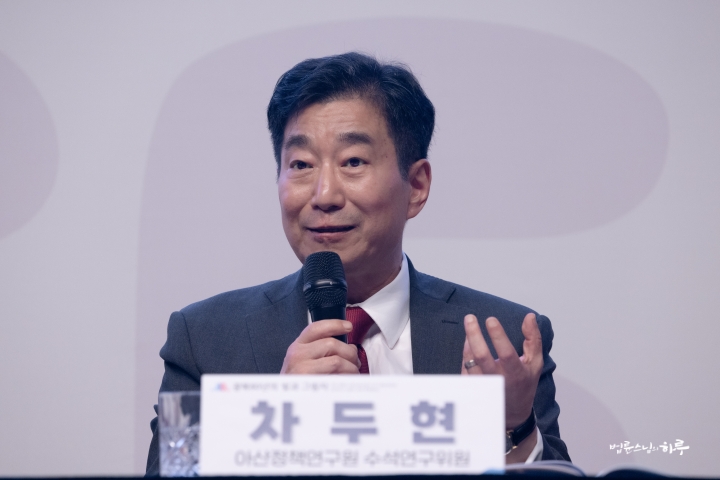
Constitutional scholar Professor Lim Ji-bong from Sogang University Law School emphasized constitutional operation through interpretation. “The territorial clause is a historical product that imposes the duty of unification. Rich interpretation is more important than deletion,” he said, adding, “If the argument for deleting Article 3 emerges, constitutional amendment will be delayed another 10 years. We need the wisdom to first succeed with one-point amendments like including the May 18 spirit in the preamble.”
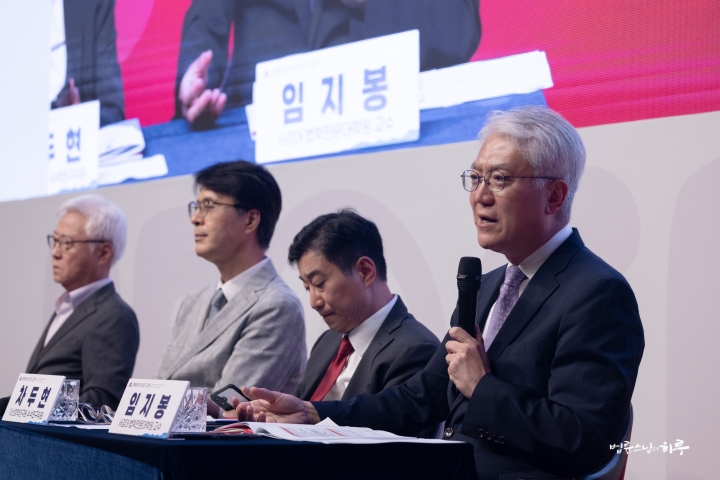
When Lee Jung-ja, representative of the Women’s Coalition for Constitutional Amendment, asked from the audience about the comprehensibility of the Article 3-4 system, Professor Lim replied, “The constitution is a norm with historicity and political nature. Inconsistencies between articles are bridged through interpretation.”
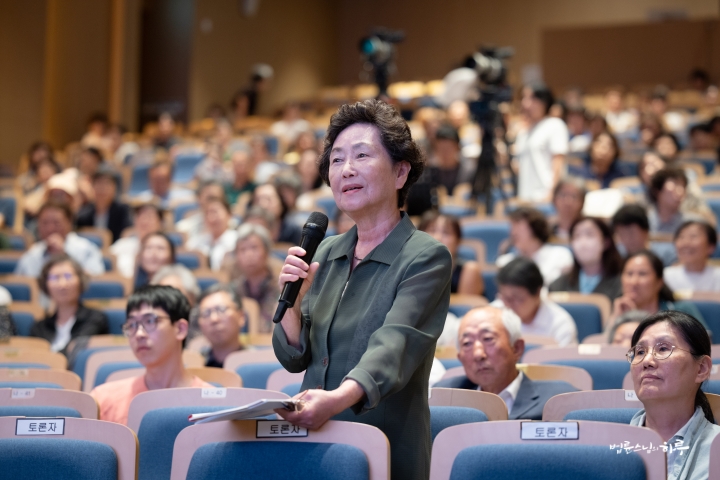
In closing, moderator Dr. Cho Min emphasized, “Peace and unification must be achieved through our own will and strength,” summarizing the discussion. This debate was a convergence of three key themes: ‘restoration of consensus,’ ‘realistic peace management,’ and ‘wisdom in constitutional governance.’ Each panelist’s suggestions provided direction for future public discourse.
Finally, Venerable Pomnyun Sunim, Chairman of The Peace Foundation, took the stage to deliver closing remarks.
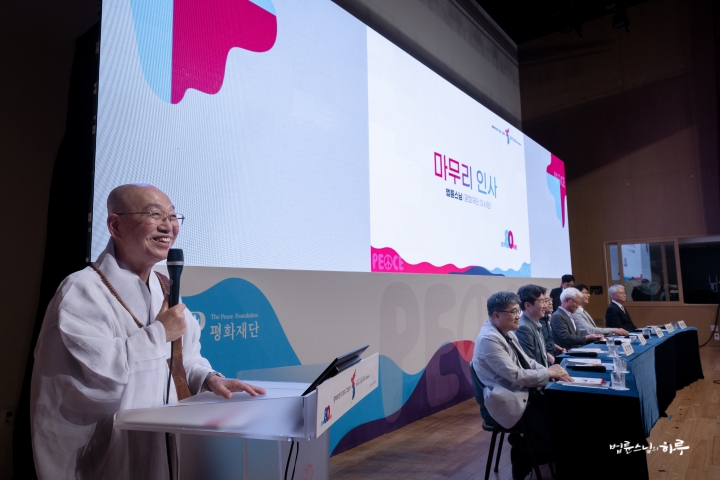
“First, I would like to express my sincere gratitude to the two presenters, the four discussants, and Dr. Cho Min for moderating today’s forum. I also thank the senior religious leaders for staying until the end. Most importantly, I thank all the audience members who participated in this four-hour forum.
I briefly pondered how we could adjust the territorial clause to preserve its historical significance without causing disputes. When Professor Choi Cheol-young mentioned that most countries don’t have territorial clauses, I was reminded of an anecdote about Master Yongseong. During preparations for the March 1st Independence Movement, there was a suggestion to use a flag depicting the 3,000-li Korean Peninsula for the demonstrations. However, Master Yongseong opposed this idea. He believed that waving a flag of the 3,000-li Korean Peninsula would be limiting ourselves to defining our territory as just the peninsula. So he suggested using the Taegeukgi instead. Recalling this story, I thought it might actually be acceptable not to have a territorial clause. When considering constitutional amendments in the future, thinking not just about the North Korean issue but also 100 or 200 years ahead, it might not be desirable to overly restrict ourselves with territorial clauses.
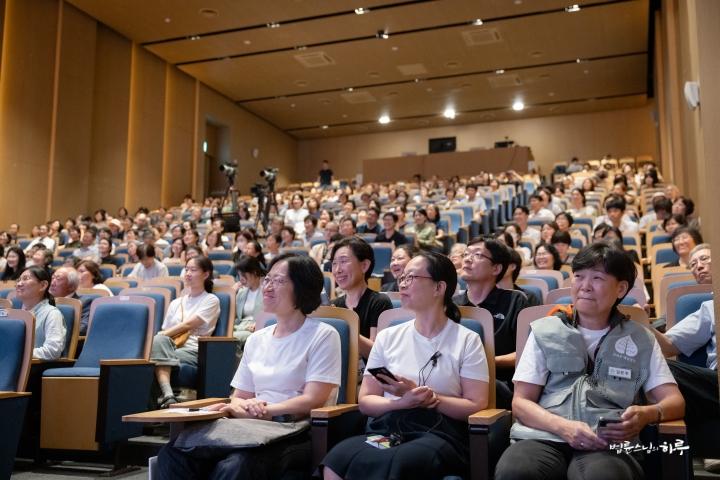
Why Doesn’t North Korea Come to the Dialogue Table?
Peace and unification involve another party. We cannot achieve unification or maintain peace on our own. The country with which we face the risk of war is not Japan or China, but North Korea. At the same time, the country with which we must unify is not the United States or Japan, but North Korea. North Korea presents a paradox: it is both our greatest adversary and our only partner for unification. Given this multifaceted relationship with North Korea, it is not advisable to adopt a one-sided perspective. We must understand that this is a special relationship that encompasses both adversarial aspects and the role of a unification partner. Therefore, we should approach this from the perspective of how to reduce the risk of war while increasing mutual cooperation to ultimately move toward unification.
There are several reasons why North Korea does not come to the dialogue table. They say, “The United States calls for dialogue while holding a knife to our throat and strangling us.” The United States conducts military exercises near the DMZ and imposes sanctions that prohibit the import and export of essential goods to North Korea, while simultaneously requesting dialogue. Therefore, they feel that the inter-Korean dialogue proposed by the United States and South Korea lacks sincerity. They believe that if the United States wants to engage in dialogue with North Korea, it should at least lower the knife at their throat or loosen the strangling grip so they can at least speak. Additionally, they question why South Korea, which boasts of being the world’s fifth-largest military power, producing cutting-edge weapons, and maintaining an alliance with the United States—the world’s strongest nation—conducts defensive exercises claiming North Korea might invade. They say they would understand if North Korea were the military powerhouse and South Korea had inferior military capabilities, necessitating preparatory exercises. However, they find it contradictory to boast about being very strong while simultaneously focusing on defensive training. They say this is difficult to understand, as it’s like the attitude of “When I do it, it’s romance; when others do it, it’s an affair.”
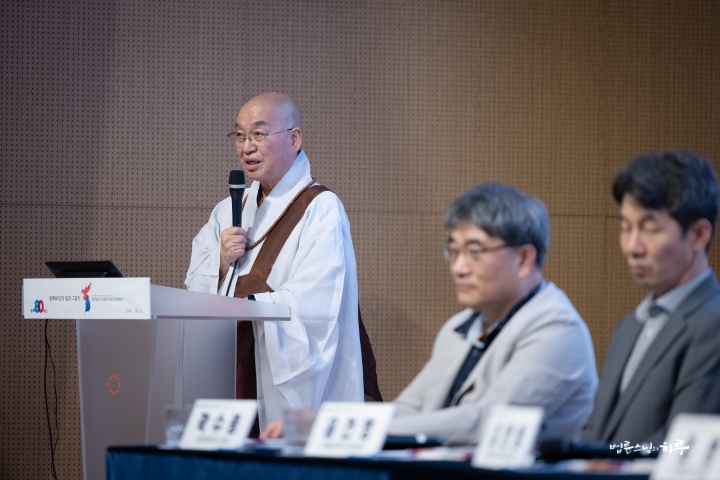
Additionally, North Korea harbors skepticism about inter-Korean dialogue due to the lack of actual results. Over the past 30 years, despite various declarations and agreements from summit meetings, four-party talks, and six-party talks, there have been no clear outcomes. Even when agreements were reached between the two Koreas, South Korea failed to implement them when administrations changed, citing internal political issues. North Korea believes that if there was genuine will to honor agreements, they could have been legislated through the National Assembly, but neither South Korea nor the United States made substantial efforts. From North Korea’s perspective, how can they trust South Korea and engage in dialogue? While this might sound like an excuse for not participating in talks, it explains why North Korea has lost interest in dialogue. Their stance now is essentially “let’s not interfere with each other and live our own lives.” While sharing these views might lead to misunderstandings that Sunim is speaking on behalf of North Korea, it’s necessary to listen to and understand North Korea’s realistic position.
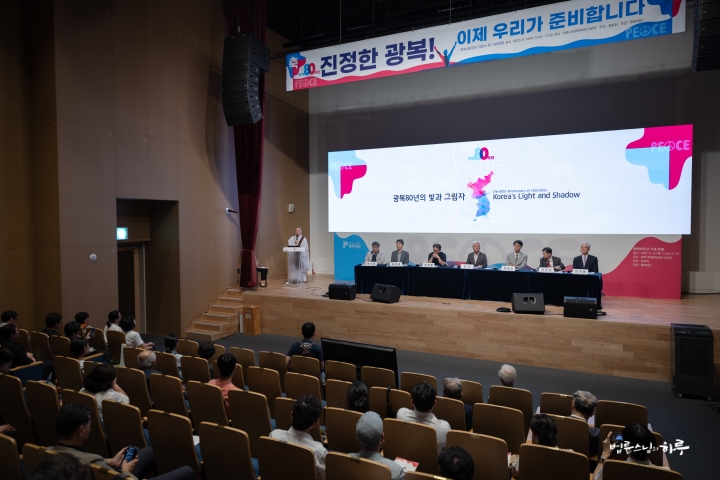
A Survival Strategy for the Two Koreas: Avoiding Entanglement in Great Power Games
Some might wonder, “Why should we understand North Korea?” Ultimately, how we understand and engage with North Korea determines whether we can preserve our peace in times of crisis. Currently, the US-China conflict is leading to risks of armed confrontation in the Taiwan Strait. Depending on which side gains advantage in such conflicts, there’s a possibility it could spill over into disputes on the Korean Peninsula. Without close cooperation between the two Koreas, we could inadvertently become entangled in great power conflicts. Ending the hostile relationship between the two Koreas isn’t for the benefit of just one side. It’s a minimum condition for the survival and prosperity of our nation. This is why we engaged in various dialogues today under the principle that “war must never happen.”
Communication Over Haste: Start by Restoring the Inter-Korean Hotline
To ease tensions between the two Koreas, we must first restore emergency communication channels. Even if we don’t immediately establish mutual relations, we should restore communication channels and address other issues gradually. South Korea should be cautious about taking the driver’s seat and rushing to resolve inter-Korean relations at this point. Since North Korea isn’t in a position to readily engage in dialogue, making excessive demands could backfire. If North Korea responds negatively with harsh rhetoric, it would only put our government in a difficult position. Therefore, South Korea needs to play a role in reducing tensions while helping North-US relations progress first. In that process, we should seize opportunities to advance inter-Korean issues to the next stage. While territorial clauses and other provisions need adjustment, there’s merit to the view that these aren’t the core obstacles to inter-Korean relations.
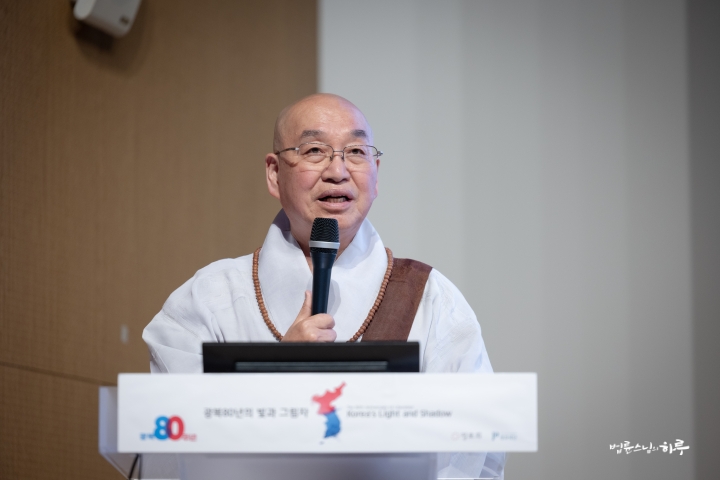
So I hope you won’t be impatient. Since the situation has changed, we need to adjust according to the changed circumstances, but first and foremost, we must maintain a peace-first stance that ‘war must never happen.’ War causes us great damage. Unification is a future benefit, while war destroys what we currently have. At the very least, we must protect what we have achieved so far and gradually pursue a better future.
I learned a great deal from listening to the experts’ insights today. Moving forward, we must clearly maintain a peaceful stance that protects national stability and citizens’ lives. And to alleviate the suffering of North Korean residents, we need to adopt an attitude of engaging in dialogue for their benefit rather than our own. Once again, I sincerely thank everyone who participated today.”
The 80th Liberation Day Commemorative Forum concluded with thunderous applause.
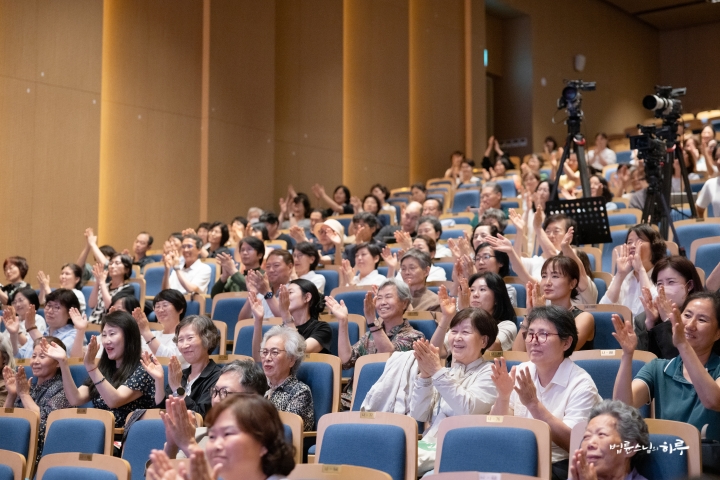
The moderator, presenters, and panelists all came up on stage for a commemorative photo.
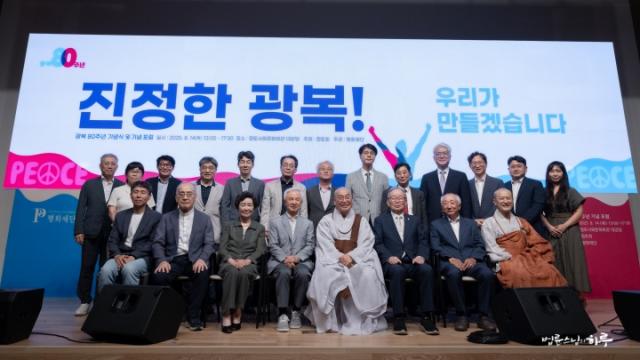
Though it was a long session, it was a precious time to reflect on the true meaning of liberation and commit to our future roles.
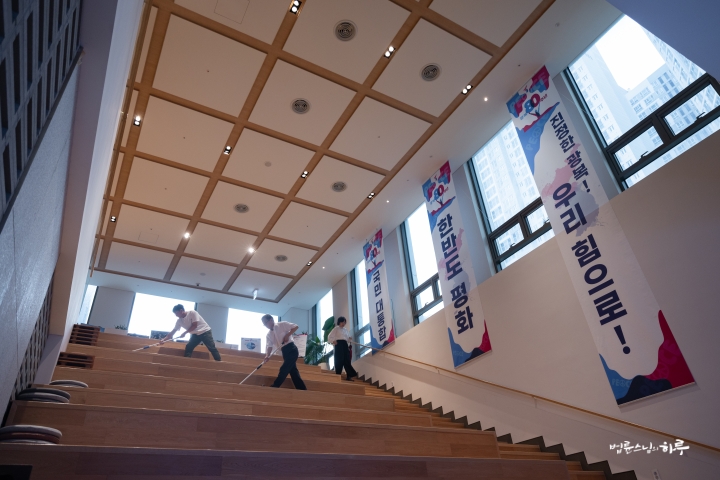
After seeing off the attending dignitaries, Sunim welcomed another guest.
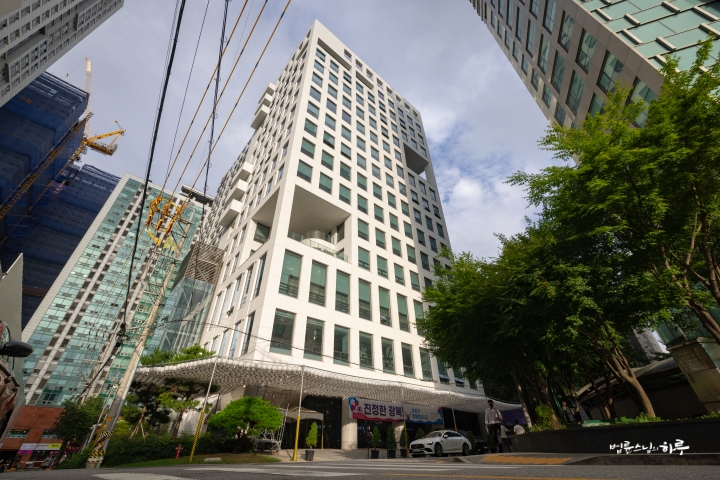
As the sun set and 7 PM arrived, Minister Jeon Jae-soo of the Ministry of Oceans and Fisheries came to visit Sunim. After having dinner together, they shared tea and conversation. Minister Jeon shared the Ministry’s long-term vision for developing Arctic shipping routes.
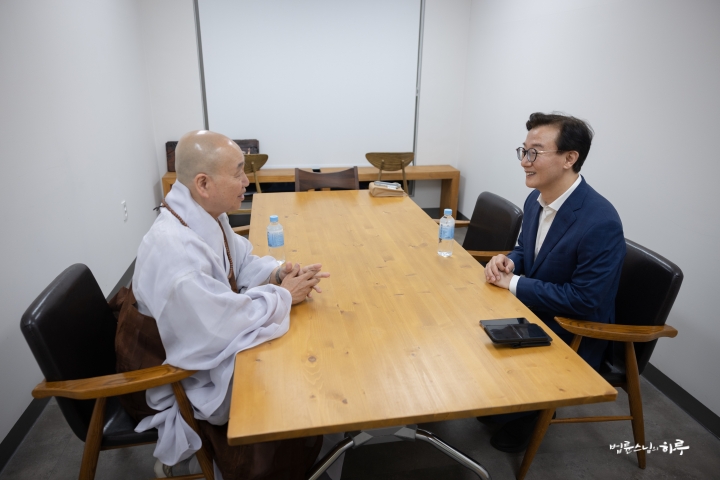
Sunim promised to give a Dharma Q&A session for Ministry of Oceans and Fisheries officials once the Ministry completes its relocation to Busan, and they concluded their conversation.
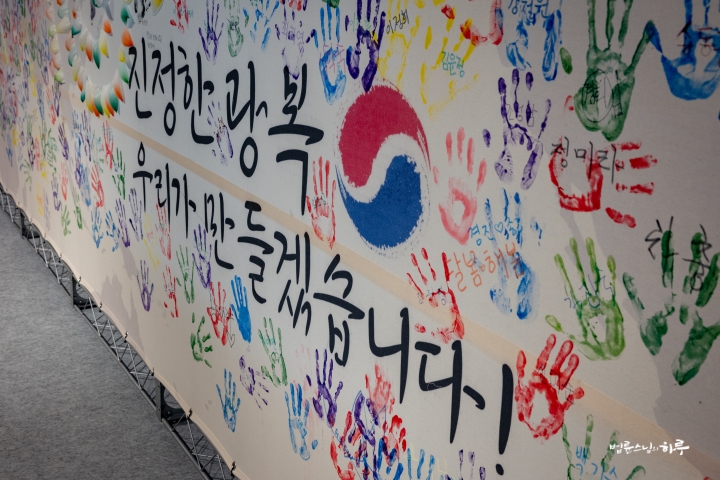
Starting tomorrow, Sunim will spend three days and two nights at the Seonyudong Education and Training Center in Mungyeong, participating in the Youth Camp organized by the Special Youth Division and engaging in conversations with young people.




